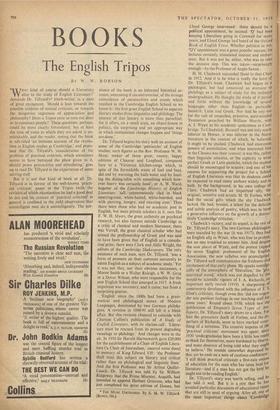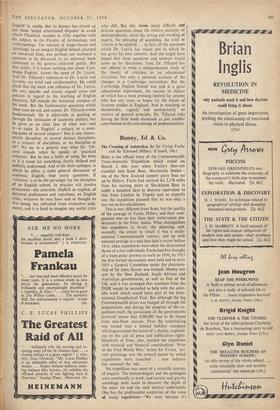BOOKS
The English Tripos
By W. W. ROBSON
*WiAT kind of course should a University allot to the study of English Literature?' demands Dr. Tillyard's* blurb-writer, in a state of great excitement. 'Should it lean towards the possible aridities of textual criticism, or towards the dangerdus vagueness of appreciation and philosophy? Does a Tripos exist to turn out dons or to construct people?' These questions, perhaps, could be more clearly formulated; but at least the tone of voice in which they are asked is un- mistakable, and the reader, noting that the book is sub-titled 'an intimate account of the revolu- tion in English studies at Cambridge,' and prom- ised that Dr. Tillyard's 'consideration of the problem of practical criticism, which sometimes seems to have betrayed the place given to it, should prove provocative and stimulating,' goes on to read Dr. Tillyard in the expectation of some stirring stuff.
But it is not that kind of book at all. Dr. Tillyard is in favour of the well-known 'practi- cal criticism' paper in the Tripos (with the revision of which examination he had a good deal to do) and his censure of 'practical criticism' in general is confined to the mild observation that unintelligent men do it unintelligently. The sub- stance of the book is an informal historical ac- count, interesting if uncontroversial, of the strange coincidence of personalities and events which resulted in the Cambridge English School as we know it : the first great English School to separate literary studies from linguistics and philology. The interest' of that history is more than parochial; for it offers, on a small scale, an object-lesson in politics, the surprising and yet appropriate way in which institutional changes happen and 'things are done.'
Dr. Tillyard begins his story with an account of some of the Cambridge 'patriarchs' of English studies; such figures as the Rev. Professor W. W.
Skeat, maker of those great, roomy, happy editions of Chaucer and Langland, compared here to a 'Victorian kitchen-range which, in spite of the formidable waste of fuel and heat, did end by warming the bath-water and by load- ing the dining-table with something which how- ever heavy was certainly food'; or A. W. Ward, begetter of the Cambridge History of English Literature, 'tall, ceremoniously clad in black morning-coat, white-haired, white-bearded, and with piercing, hungry, and exacting eyes.' Then there were those who had no academic post in English, but were private scholars in it, men like F. W. H. Myers, the great authority on psychical research, but also famous outside Cambridge as a critic of classical and modern literature; there was Verrall, the great classical scholar who had missed the professorship of Greek and was said to have been given that of English as a consola- tion' prize; there were Clark and Aldis Wright, the editors of the Cambridge Shakespeare. The very existence of such men, says Dr. Tillyard, 'was a form of pressure on their common university to admit English as a subject of academic study.' Yet it was not they, nor their obvious successors, a Moore Smith or a Walter Raleigh, a W. W. Greg or a Dover Wilson, who were responsible for the new English School that emerged in 1917. A fresh impulsion was necessary, and it came; but from a surprising quarter.
'English' since the 1880s had been a gram- matical and philological annex of Modern Languages, dominated by two German philolo- gists. A revision in 1890-91 still left it a bleak affair. But this revision chanced to coincide with Churton Collins's publication of A Study of English Literature, with its clarion-call : 'Litera- ture must be rescued from its present degrading vassalage to philology.' And changes were in the air. In 1910 Sir Harold Harmsworth gave £20,000 for the establishment of a Chair of English Litera- ture ('a Chair of Journalism,' sneered some dons) in memory of King Edward VII: 'the Professor shall treat this subject on literary and critical rather than on philological and linguistic lines.' And the first Professor was Sir Arthur Quiller- Couch. Dr. Tillyard was told by Sir William Ridgeway that the Prime Minister, Asquith, had intended to appoint Herbert Grierson, who had Just completed his great edition of Donne, but
* THE MUSE UNCHAINED. By E. M. W. Tillyard. (Bowes, 16s.)
Lloyd George intervened : there should be a political appointrhent, he insisted. 'Q' had been keeping Liberalism going in Cornwall for many years, and Lloyd George had heard of the Oxford Book of English Verse. Whether political or not. `Q's' appointment was a great popular success; his lectures certainly stimulated interest and enthus- iasm. But it was not he, either, who was to take the decisive step. This was taken—surprisingly enough—by the Professor of Anglo-Saxon.
H. M. Chadwick succeeded Skeat in that Chair in 1912. And it is he who is really the hero of Dr. Tillyard's book. Chadwick had begun as a philologist, but had conceived an aversion to philology as a subject of study for the ordinary undergraduate. He thought the study of it partial and futile without the knowledge of 'several languages other than English—in particular Sanskrit, Latin and Greek. Nor had he any use for the cult of unspoiled, primitive, pure-minded Teutonism preached by William Morris, with A. J. Wyatt as his academiC spokesman at Cam- bridge. To Chadwick, Beowulf was not only much inferior to Homer, it was inferior to the Norse literature in the context of which, he believed. it ought to be studied. Chadwick had enormous powers of assimilation, •and what interested him in the Classics.was their content; it was this, rather than linguistic minutia;, or the capacity to write perfect Greek or Latin pastiche, which the student should be encouraged to acquire; and one of his reasons for supporting the project for a School of English Literature was that its students could be expected to read many authors widely and in bulk. In the background,' in his own college of Clare, Chadwick had an important ally, the original, sensitive and artistic M. D. Forbes, who had the social gifts which the shy Chadwick lacked. He had, besides, a talent for the delicate and subtle analysis of poetry, which was to have a generative influence on the growth of a distinc- tively 'Cambridge' criticism. Chadwick's victory, and its sequel, is the rest of Dr. Tillyard's story. The two German philologists were muzzled by the war (it was 1917); they had an English ally in Wyatt, who was free to protest, but no one troubled to answer him. And despite the non placer of Wyatt, and the protest (signed by seven 'English' professors) of "the English Association, the new syllabus was promulgated. Dr. Tillyard well communicates the freshness and excitement of that early phase. He speaks nostalFt- cally of the atmosphere of 'liberalism,' the `g Y, uncritical mood,' which was not dispelled by the would-be scientific rigours of I. A. Richards, an important early recruit (1919). A sharpening of controversy developed with the influence of T. S. Eliot's criticism, though even this 'did not engen- der any partisan feelings in our teaching staff for some years.' Round about. 1930, which saw the publication of Empson's Seven Types of Am- biguity, Dr. Tillyard's story draws to a close. For him the premature death of Forbes, and the de- parture of Richards, seem to have marked sonic' thing of a terminus. The creative impetus of the `practical criticism' movement was spent; since 1930 'undergraduates have been a little less readY to think for themselves, more burdened by liberty, and more desirous of being told what they ought to believe.' He sounds somewhat depressed by this, yet he ends on a note of cautious confidence: 'I still think practical criticism a first-rate means of education for the man who has some bent for literature—and if a man has not got the bent he ought not to be reading English.' Dr. Tillyard's story was worth telling, and he has told it well. But it is a pity that he has avoided particular discussion of educational issues. that are still in need of arguing. After all, one of the most important' things about 'Cambridge English' is, surely, that its history has stirred up just those 'major educational disputes' to avoid which Chadwick seceded in 1926, together with his subject, to the Faculty of Archwology and Anthropology. The relation of Anglo-Saxon and 'philology' to an integral English School, planned on historical lines, was perhaps too technical a question to be discussed in an informal book addressed to the 'general educated public. But that public, if it knows nothing else about 'Cam- bridge English,' knows the name of Dr. Leavis. And Dr. Tillyard's references to Dr. Leavis and Scrutiny are brief and uninformative. He could plead that the work and influence of Dr. Leavis, the very specific and closely argued views and policies in regard to the teaching of English literature, fall outside the historical compass of his book. But the fundamental questions which these raise do not, and cannot. Dr. Tillyard avoids fundamentals. He is admirable in guiding us through the intricacies of academic politics, but he gives us no clear idea of what was—and is—at stake. Is 'English' a subject, or a meet- ing-point of several subjects? Has it one charac- teristic discipline, or several distinct disciplines, or a mixture of disciplines, or no discipline at all? We see in a general way what Dr. Till- yard intends when he speaks of 'practical criticism.' But he has a habit of using the term as if it stood for something clearly defined and Publicly understood. And so his short epilogue, in which he offers a more general discussion of academic English, begs many questions. If 'criticism' is to be the paradigm for the discipline of an English school, its practice will involve evaluation—the assertion, implicit or explicit, of Personal preferences and rejections; no English critic, whatever he may have said or thought he was doing, has refrained from evaluative judg- ments, and it is hard to imagine any useful critic who did. But this raises many difficult and delicate questions about the relative maturity of undergraduates, about the setting and marking of papers, the phrasing of questions, the kind of criteria to be applied . . . in fact, all the questions which Dr. Leavis has raised and to which he has given his own answers. And one might have hoped that these questions and answers would come up for discussion. True, Dr. Tillyard has not offered to write a comprehensive study of the theory of criticism as an educational discipline, but only a personal account of the changes in a Cambridge curriculum. But the Cambridge English School was and is a great educational experiment, the success or failure of which has a most pressing interest for anyone who has any cares or hopes for the future of humane studies in England. And in touching so incidentally, vaguely and perfunctorily on matters of general principle, Dr. Tillyard risks having his little book dismissed as just another contribution to the anecdotage of professionalism.



































 Previous page
Previous page